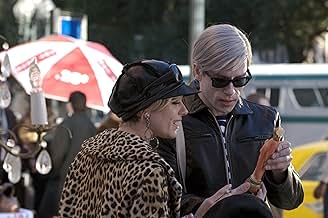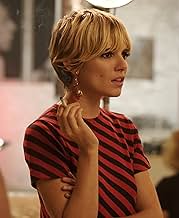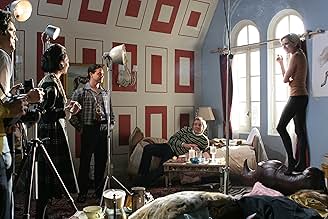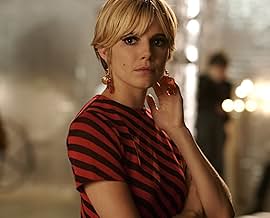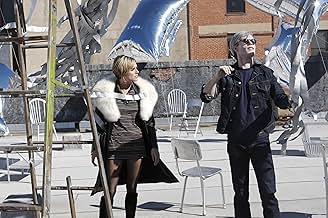Based on the rise and fall of socialite Edie Sedgwick, concentrating on her relationships with Andy Warhol and a folk singer.Based on the rise and fall of socialite Edie Sedgwick, concentrating on her relationships with Andy Warhol and a folk singer.Based on the rise and fall of socialite Edie Sedgwick, concentrating on her relationships with Andy Warhol and a folk singer.
- Awards
- 1 nomination total
Featured reviews
Just in case you read some of the rather hysterical comments and garner the impression that it's supposed to be about real people, it's not. Andy Warhol was never a real person, just a performance.
Guy Pearce presents Andy Warhol as the superficial creature he undoubtedly was. The original art-as-business creator, the very God at whose altar such modern day charlatans as Damien Hirst worship. Pearce's performance is riveting, his Andy Warhol is as empty as his crapulous art; just a two-dimensional diagram of someone who leaves no shadow. A cartoon.
Sienna Miller's performance as Edie Sedgewick is the best thing she's ever done. Caught in the strobe lights of Warhol's strangely sterile world of non-sexual sex and sofas still in their plastic wrappers, Edie becomes the focus of his short attention span for a while. She flashes across the screen like a speeded up Holly Golighty, while Warhol's voyeuristic viewfinder traps her in it's leering stare. The camera loves her and so does Warhol. But we know it's going to end in tears.
Nothing in the movie has much depth, none of the characters are developed beyond what we already know about them and the whole sixties New York scene is represented by a series of iconic "things". The Chelsea Hotel, the Velvet Underground, a soundtrack of songs that sound right but which actually don't fit at all. For instance, "Leavin' here" by The Birds, a British group in which Ronnie Wood was the guitarist, was recorded in 1966 but was never released in America. However, there it is on the soundtrack being played in the factory sometime in 1965.
But no matter.
The movie pretty much captures the shallow, transient and utterly facile world of Warhol in the sixties and in another way it sums up the emptiness and tragedy of the Hollywood dream machine too. But it doesn't ask any deep questions nor does it pretend to be something it's not. It's entertaining and worth watching for two very good performances by Guy Pearce and Sienna Miller.
It's not art, it's just a movie, albeit a superficial one.
Did Hickenlooper paint Edie as a perpetual victim (notice how throughout the film she is never injecting herself but is bent over while others inject her?) just so that he could show her as a victim of Andy Warhol and his drug fiend factory friends? Or that she was always a victim of people like her friend Chuck who did a complete turn on her for that villain Andy? Is Hickenlooper trying to say that the biggest mistake of Edie's life was not choosing Dylan over Warhol in that elevator scene where her future self voices over, "that was the biggest mistake of my life"? Edie Sedgwick came to the factory a sick person, she was already headed for a crash even before she set eyes on Andy Warhol. In reality, she was rejected by the factory friends and many others for the drugs she brought with her everywhere, she was not introduced to them at the factory as the movie shows.
Hickenlooper seems to me to be trying to say that Edie Sedgwick, that fresh faced wasp in knee socks and pearls who left Cambridge with sketches tucked under her arms could have potentially had a wonderful and peaceful life, even a stable marriage with Bob Dylan had she only not met Andy Warhol and been subject of those movies.
I have a problem with this film because I am so interested, most people are, in the real Edie Sedgwick and I agree with another poster who suggested you see Ciao!Manhattan to get a better sense of who she was. If you want a tragic love-story about a good girl who chose the wrong guy, watch Factory Girl.
The real Edie Sedgwick was a person whose hystrionics and drugs were symptoms of a soul that was always trying to fly away, for her the world was always too small and her pain was always too big, and she lived her life as though she dreamed of having her wings singed flying too close to the sun.
While we do spend a good portion of the film in The Factory, this is more the tragic story of Edie, rather than an insightful look at Warhol's art. Edie was really the first to make being famous a job ... think Paris Hilton today. No real talent herself, her name, family money and looks got her inside the art world and exceptionally close to Warhol. Of course, those things were not enough to carve out any real territory and the ending, while tragic, is not at all surprising.
The film is overly choppy in attempting to find the right look and feel and yet with Jagger, Velvet Underground and the Dylanesque Hayden Christensen, the importance and power of music for this era is clearly established. Aussie Guy Pearce does a nice impersonation of Warhol and Jimmy Fallon has his first serious role. Other support comes from Mena Suvari as Edie's friend, Beth Grant as Warhol's mom, Don Novello (Father Guido from early SNL), and Illeana Douglas as Diana Vreeland.
By far the best part of this project is the performance of Sienna Miller as Edie Sedgwick. Even her vocal cadence is remarkable. The physical and emotional turmoil seems very real as Edie goes from top of world to desperation for life. Ms. Miller will at some point break out and become the film star she is destined to become. That role has just not quite happened yet. It could be later this year when she re-teams with her "Layer Cake" director. Let's hope so. Her talent is undeniable and although it is a pleasure to see her performance as Edie, she deserves a much wider audience.
The weakness of the film is best shown by the interviews over the closing credits. Attempting to explain what we had just watched is a pure indication that the job had not been done well.
First off there's the acting which is all over the place, some people are doing great while others aren't allowed enough room. Casting Sienna Miller was a good call, its a difficult role to cast but if they felt they had to go with a "name" then Sienna was the right choice. As for Guy Pearce as Andy Warhol, that really worked and its a true shame that the film was such a mess you couldn't realize that Guy Pearce was turning in an excellent performance. Especially if you have seen his work in L.A. Confidential and Memento, I had to remind myself a few times oh yea thats Guy Pearce. Had Factory Girl functioned as a GOOD FILM Guy Pearce would have received much more acclaim.
As for Hayden Christensen, I like him alright as an actor but his role as the Bob Dylan-esquire Musician just wasn't allowed much room. He was crammed into a corner spouting out cliché lines and trying his best to do an impression rather than an interpretation. This film was around 90 minutes long, and it should have been around 2 hours long considering all of the significant characters. You can't just brush by Andy Warhol and Bob Dylan (even though they don't officially call the Bob Dylan character Bob Dylan).
What I did like about this movie was that Warhol was portrayed as a little bit cold and detached, but Sedgwick was portrayed as being equally messed up and responsible for her own downfall. So the blame wasn't placed anywhere. Having actors like Jimmy Fallon and one of the Olsen twins in this movie only made me go "what are they doing here?" Pearce and Miller really did give it there all, and even that wasn't enough to elevate this sometimes incoherent mess. Its a mess, but I was still interested thanks to the two leads. I can't wait until Sienna Miller is given a lead role in a GOOD movie.
Did you know
- TriviaSienna Miller improvised the scene in which Edie tells The Musician about her brothers' deaths.
- GoofsEdie Sedgwick's relationship to Nico is depicted incorrectly: in reality they were friends and Edie warned Nico about Andy Warhol's behavior. Edie's death was very sad for Nico.
- Quotes
Andy Warhol: I wonder if people are going to remember us?
Edie Sedgwick: What, when we're dead?
Andy Warhol: Yeah.
Edie Sedgwick: Well, I think people will talk about how you changed the world.
Andy Warhol: I wonder what they'll say about you... in your obituary. I like that word.
Edie Sedgwick: Nothing nice, I don't think.
Andy Warhol: No no, come on. They'd say, "Edith Minturn Sedgwick: beautiful artist and actress...
Edie Sedgwick: ...and all-around loon.
Andy Warhol: ...Remembered for setting the world on fire...
Edie Sedgwick: ...and escaping the clutches of her terrifying family...
Andy Warhol: ...Made friends with eeeeverybody and anybody...
Edie Sedgwick: ...creating chaos and uproar wherever she went. Divorced as many times as she married, she leaves only good wishes behind.
[laughs]
Edie Sedgwick: That's nice, isn't it?
- Crazy creditsDuring the first part of the end credits, photos are shown of the real Edie Sedgwick. Also people who knew her give testimonies about her.
- Alternate versionsAccording to the FAQ section: "For the home theatre market, an unrated version was released aside from the R-rated theatrical version. Most scenes which were re-inserted or alternately shifted, serve to specify character drawings and various aspects of the story which were only embedded in the theatrical version to some extent. However, there are also a few extensions with sexual contents and more explicit depictions of drug use."
- SoundtracksDino's Song
Written by Chet Powers (uncredited)
Performed by Quicksilver Messenger Service
Courtesy of Capitol Records
Under License from EMI Film & Television Music
Details
Box office
- Budget
- $7,000,000 (estimated)
- Gross US & Canada
- $1,675,241
- Gross worldwide
- $3,572,632
- Runtime
- 1h 40m(100 min)
- Color
- Sound mix
- Aspect ratio
- 1.85 : 1



